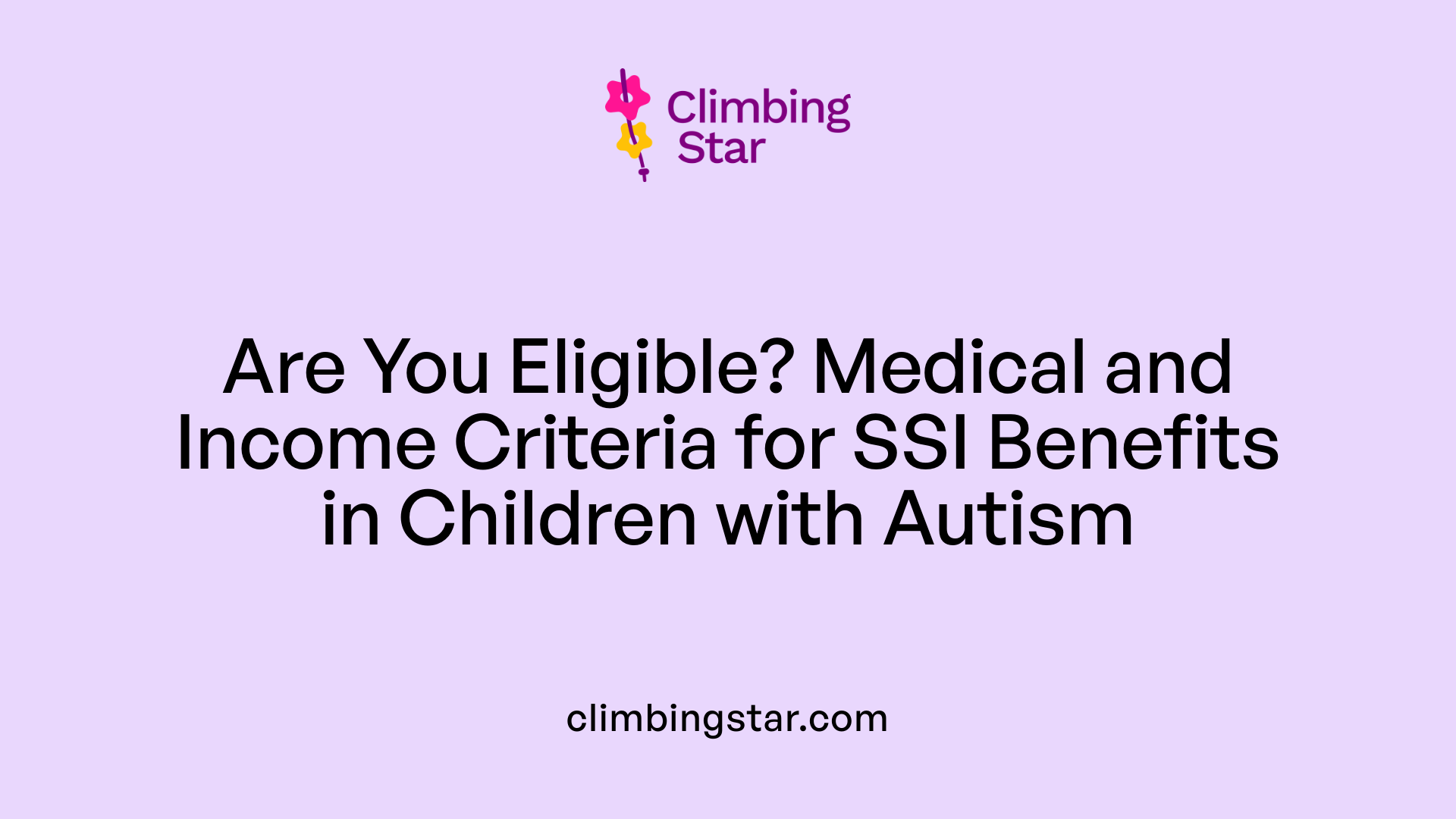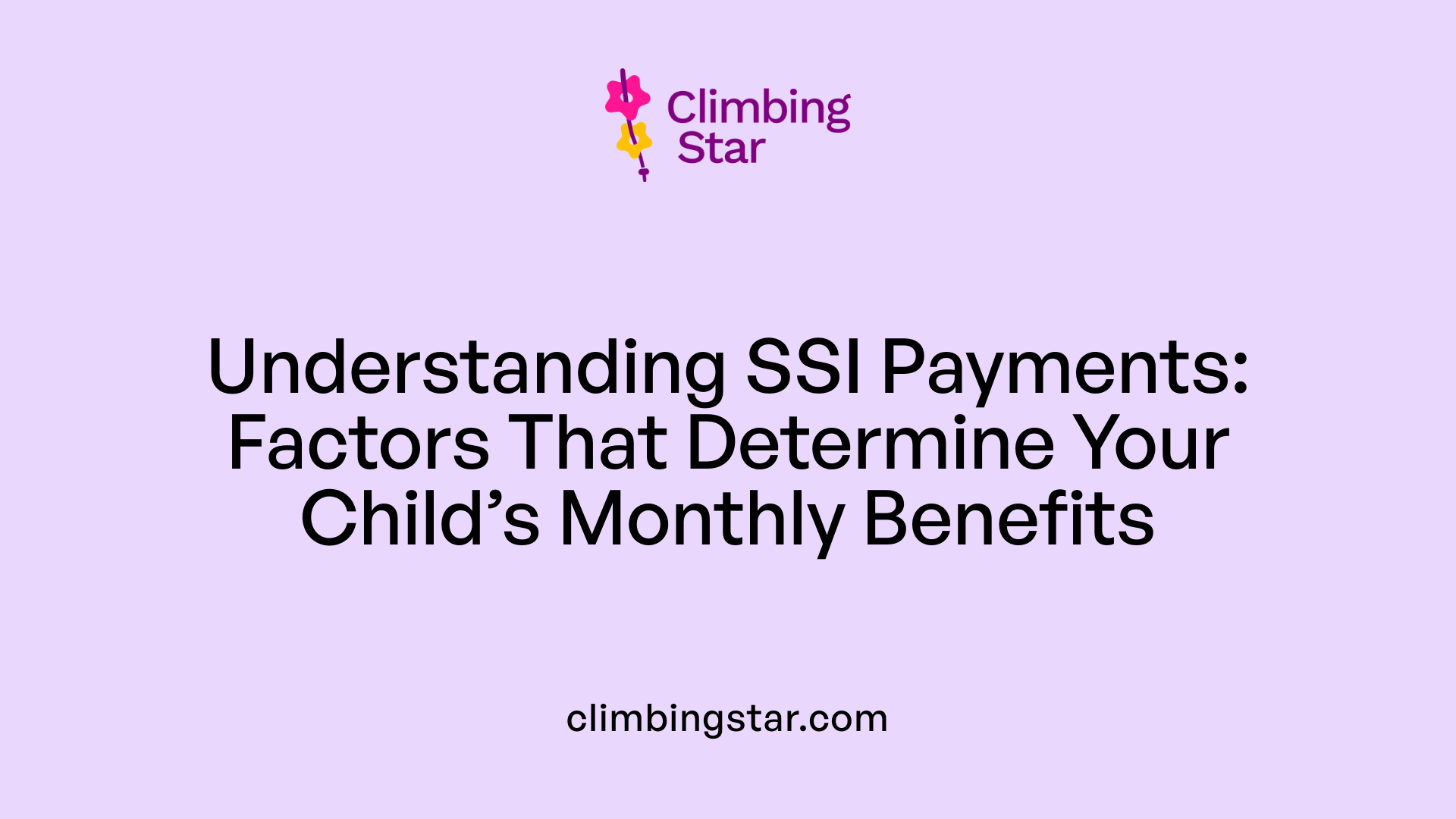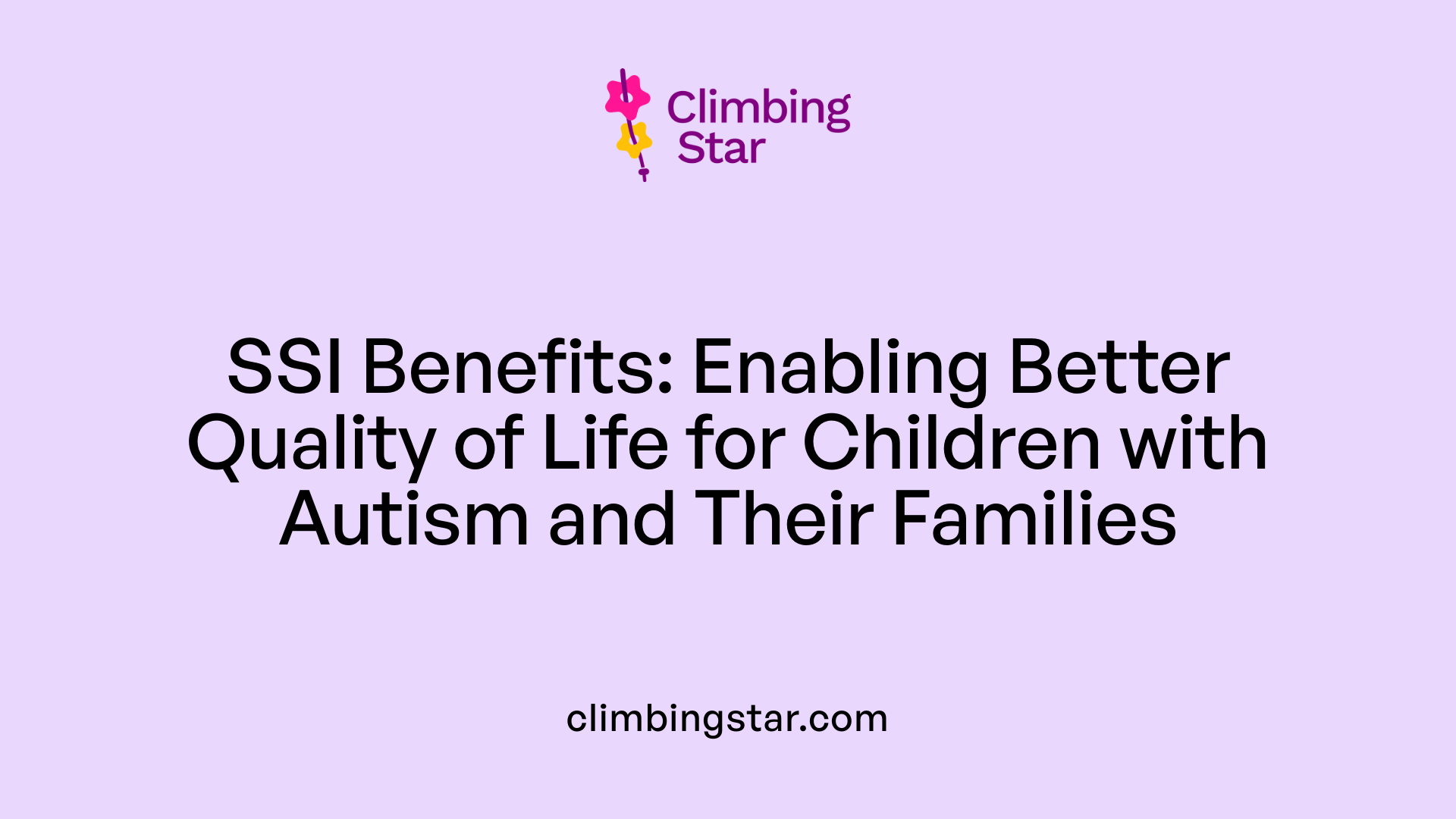A Comprehensive Overview of Financial Support for Autistic Children
Navigating the world of benefits for children with autism can be complex. Supplemental Security Income (SSI) offers vital financial assistance to support families caring for children with significant disabilities. This article explores who qualifies, how benefits are calculated, and what families can expect in terms of financial support, ensuring guardians are well-informed about the potential resources available for their children’s needs.
Eligibility Criteria for SSI Benefits in Children with Autism

What general information is available about SSI benefits for children with autism, including eligibility and payment amounts?
SSI (Supplemental Security Income) benefits aim to support children with autism and other disabilities by providing financial assistance. These benefits are designed for children under 18 (or up to age 22 if they qualify as students) who have a healthcare condition leading to significant functional impairments.
To qualify, children must demonstrate a medically determinable impairment — in the case of autism, essential features include deficits in social interaction, communication skills, and restricted, repetitive behaviors. They must meet specific medical and functional criteria, showing extreme limitations in areas like understanding, interacting, concentrating, and self-care.
Eligibility isn't solely based on medical diagnosis; family income and resources also play a crucial role. The federal benefit in 2023 was up to $914 per month, but the exact amount varies based on family income, resources, and state-specific adjustments. Many children who qualify for SSI also automatically gain access to Medicaid, offering valuable health coverage.
The application process requires detailed medical and educational documentation, including reports from healthcare providers, to substantiate the child's condition. Once approved, benefits can be paid to the child's designated representative, usually a parent, and funds must be used for the child's current needs such as food, clothing, housing, and medical costs.
Furthermore, the benefits are subject to periodic reviews, typically every three years, to confirm ongoing eligibility. If the child’s condition remains severe and meets SSA criteria, benefits may continue as they transition into adulthood, especially if they qualify under SSDI rules after age 18.
Conditions that qualify children with autism for SSI
Children with autism qualify for SSI if they meet specific medical and functional criteria set by SSA. Key features include difficulty in social activities, communication challenges, and repetitive behaviors. These symptoms must cause significant limitations, confirmed through medical documentation.
Additionally, children with autism often have extremely limited abilities in understanding, social interaction, focusing on tasks, or self-management. Medical reports must document these impairments, often requiring detailed assessments from health providers.
Children with severe autism might qualify immediately for benefits when diagnosed, especially if they meet the SSA's severity criteria, and their condition is expected to last at least 12 months or result in death.
Medical criteria and documentation requirements
To qualify, families need to submit medical evidence demonstrating the severity of autism. This includes detailed reports describing deficits in social communication, verbal and nonverbal communication skills, and presence of restricted, repetitive behaviors.
Additional documentation should show the child's overall functional limitations: extreme difficulty in areas like understanding others, maintaining social interactions, concentrating, and self-care. These reports must come from licensed healthcare professionals familiar with the child's condition.
The SSA may directly contact medical professionals or facilities for records to ensure accurate evaluation. This rigorous documentation process helps SSA determine the child's eligibility based on the functional impact of autism.
Income and resource limits for families
Family income and resources significantly influence SSI eligibility. The federal government sets certain income thresholds, but these vary by state and household specifics.
In 2023, the maximum federal benefit was $914 monthly, but the actual amount received depends on the family's income and resources. The SSA uses a process called 'deeming' to consider parental income and resources when assessing eligibility.
'Deeming' involves attributing a portion of the parent's income and assets to the child's eligibility calculation. It stops when the child turns 18, marries, or no longer lives with the parent.
States may have additional rules or adjustments, but generally, if family income exceeds certain limits, the child's SSI is reduced or denied. Moreover, if the family's resources—like bank accounts or property—exceed the allowable limits, the child may not qualify.
Deeming process of parental income and resources
Deeming is a process where SSA considers a parent's or caregiver's income and resources when determining a child's eligibility for SSI. This approach recognizes that parental financial support contributes to the child's well-being.
Parents or guardians must report income, assets, and expenses accurately when applying. The SSA assesses whether the combined household income surpasses the allowable threshold, which would reduce or eliminate benefits.
This deeming process remains in effect until the child reaches age 18, after which the child's eligibility is reassessed independently, unless specific conditions apply.
Age-related eligibility milestones
Children may qualify for SSI benefits until age 18, provided they meet the impairment criteria. When they turn 18, SSA switches from childhood disability standards to adult disability standards.
In some cases, children's benefits continue beyond 18 if they have a disability that began before age 22. Such individuals can receive Social Security Disability Insurance (SSDI) benefits on a parent's record.
Eligibility for adults involves different criteria, especially related to work history and earnings. However, the transition process allows eligible individuals to maintain benefits under specific conditions, ensuring ongoing support.
Helping children with autism and other disabilities access SSI benefits requires thorough documentation and understanding of age-specific rules. These benefits can provide critical financial support and health coverage for families navigating complex eligibility requirements.
| Aspect | Details | Additional Notes |
|---|---|---|
| Max Monthly SSI (2023) | $914 | Varies by state and family circumstances |
| Qualifying Conditions | Severe deficits in social interaction, communication, repetitive behaviors | Must last >12 months or lead to death |
| Medical Documentation | Reports from healthcare professionals | Needed to prove severity of autism |
| Income Limits | Based on household income and resources | Deeming process applies |
| Age-related Changes | Benefits until 18, then transition to adult standards | Benefits can continue if disability started early |
| Related Programs | Medicaid, CHIP | Essential for healthcare support |
Continued access to SSI benefits and related health programs depends on accurate reporting, ongoing evaluations, and adherence to SSA rules, ensuring children with autism receive necessary support as they grow.
Medical and Functional Criteria for Autism in SSI Eligibility
What are the eligibility criteria and process for applying for SSI benefits for children with autism?
Children with autism may qualify for Supplemental Security Income (SSI) benefits if they meet specific medical and functional criteria set by the Social Security Administration (SSA). To begin the application, parents should ensure their child's condition is considered a severe, ongoing disability that’s expected to last at least 12 months or result in death.
The first step involves gathering comprehensive medical documentation. This includes records from healthcare providers, educational reports, proof of identity, and proof of household income and resources—since SSI eligibility also depends on financial circumstances.
The application can be submitted through various methods: online via the SSA website, by mail, or in person at a local SSA office. The process is free of charge. After submission, the SSA reviews the case, which typically takes between three to five months. During this time, additional medical evaluations or documentation may be requested to verify the child's condition.
For children diagnosed with autism, the SSA looks for evidence of deficits in three key areas:
- Social interaction
- Verbal and nonverbal communication
- Restricted, repetitive behaviors or interests.
Medical documentation should clearly describe these deficits and demonstrate an extreme limitation in understanding, engaging with others, focusing on activities, and self-management.
If the child's autism is severe enough to cause marked and sustained functional limitations in daily life, they may qualify for benefits. These include not only monthly payments but often automatic eligibility for Medicaid, which helps cover medical costs.
Approval depends on whether the documented impairments significantly interfere with daily functioning and meet the duration requirements. If the application is denied, parents can appeal within 60 days to continue seeking assistance.
How does autism severity impact functional limitations and eligibility?
The severity of autism plays a crucial role in determining SSI eligibility. Children with profound impairments in social skills, communication, and behaviors that interfere with daily activities are more likely to qualify.
The SSA assesses the degree to which autism impacts:
| Area of Functioning | Description | Impact on Eligibility |
|---|---|---|
| Social Interaction | Ability to interact appropriately with peers and adults | Severe deficits can qualify the child as disabled |
| Communication Skills | Verbal and nonverbal communication | Significant impairments support eligibility |
| Behavior and Repetitive Interests | Restricted, repetitive behaviors or interests | Severe behaviors that hinder daily functioning |
| Daily Living Skills | Self-care, focus, and task management | Marked limitations can meet disability thresholds |
The greater the impact in these areas, the higher the likelihood of qualifying for benefits.
Medical documentation needed to verify diagnosis
Proper documentation is vital for SSI approval. Healthcare providers should prepare detailed reports that include:
- Diagnosis confirmed by a qualified medical professional;
- Descriptions of deficits in social, communication, and behavioral areas;
- Evidence of those deficits being severe and persistent;
- Notes on how the child's condition limits daily activities;
- Records indicating that these impairments are expected to last at least 12 months.
Educational and psychological assessments that illustrate functional limitations are also helpful, providing a comprehensive view of the child's needs.
What about the expected duration and impact of autism on daily functioning?
Autism typically results in ongoing challenges that affect multiple areas of life. The SSA considers whether these limitations are expected to last at least a year or result in death.
Children with autism often face barriers in communication, social interaction, and behavior management. These difficulties can interfere with school, social activities, and self-care.
The impact is evaluated through medical and educational evaluations, with special attention to how impairments prevent the child from functioning independently or participating fully in typical activities.
The application process and evaluation criteria aim to establish whether the child's impairments are severe enough to warrant ongoing support, ensuring that children living with significant autism-related challenges receive the assistance they need.
How SSI Payments Are Calculated for Children with Autism

How are SSI benefits for children with autism calculated?
SSI (Supplemental Security Income) payments for children with autism are primarily determined by the federal benefit rate, which is adjusted annually to reflect changes in the cost of living. In 2023, the maximum federal benefit for an individual is $914 per month, with the full federal rate set at $841 for 2022, and these figures are updated yearly. The actual amount a child receives can vary depending on several factors, including state-specific additions and the child's family's income and resources.
The amount payable is influenced by the child's level of disability and the impact on daily functioning. To qualify, children must demonstrate substantial functional limitations caused by autism, such as impairments in social interaction, communication, or exhibiting restricted, repetitive behaviors. These deficits must be severe enough to result in marked limitations that last or are expected to last for at least 12 months.
Medical evidence plays a crucial role in the calculation process. Families need to provide detailed documentation from healthcare professionals that confirm the severity of autism-related impairments. This documentation should include assessments of the child's capabilities in understanding, interacting with others, maintaining focus, and managing themselves.
Federal benefit rate adjustments and state variations
The federal benefit rate forms the baseline, but states can add local payments, which can increase the overall monthly SSI amount. For instance, some states offer additional payments to help cover living costs, varying by location. Local SSA offices can provide specifics about the total benefit amount available in each state.
Income and resource considerations
SSI benefits are means-tested, meaning they are impacted by the family’s financial situation. The child's parent or guardian’s income and resources are considered through a process called ‘deeming,’ which can reduce the monthly benefit if the family’s income exceeds specific thresholds. These thresholds are outlined in the Deeming Eligibility Chart for Children, which takes into account the number of ineligible children and household income.
Deeming continues until the child turns 18, gets married, or no longer lives with the parent. After age 18, the assessment shifts to the individual’s own income. If the family’s income is above the limit, the child's SSI payment might be reduced or entirely withheld.
Deeming of parental income and assets
Deeming involves calculating how much of the parent’s income and resources are considered available to the child. This process may significantly affect the benefit amount, especially for households with higher income or assets. However, once the child reaches 18, this deeming process stops, and eligibility is based solely on the individual’s income and disability status.
Impact of severity of autism on payment amount
The severity of autism directly influences eligibility for SSI and the amount awarded. Children with more severe impairments, such as total blindness, deafness, or profound developmental disabilities associated with autism, are more likely to qualify for immediate payments. These benefits are especially vital for children with significant functional limitations, including extreme difficulties in understanding, interacting with others, or controlling their behaviors.
In cases where autism leads to diagnosed medical issues like intellectual disability, muscular dystrophy, or symptomatic HIV infection, children can qualify for benefits while their disability is being fully evaluated. The duration of initial benefits may be up to 6 months, after which a more detailed review of continued eligibility occurs.
Medical evidence required for calculation
To determine the amount and eligibility, SSA requires comprehensive medical documentation. This should include reports that confirm the child's impairments and describe how these impairments affect daily activities. Information about deficits in social interaction, communication, repetitive behaviors, and other functional limitations must be provided.
Additional evidence might include educational records and psychological assessments that detail cognitive and behavioral challenges associated with autism. The goal is to establish that the child's condition results in marked and severe limitations, satisfying the criteria for SSI eligibility.
| Aspect | Details | Additional Notes |
|---|---|---|
| Federal payment rate | Up to $914/month (2023) | Adjusted annually |
| State variations | Additional local payments | Varies by state |
| Income consideration | Family income impacts benefit | Through deeming |
| Medical criteria | Severe functional deficits | Must last or be expected to last 12 months |
| Eligibility duration | Until age 18 or 22 if student | Reviews typically every 3 years |
| Autism-related conditions | Social/communication deficits, repetitive behaviors | Medical documentation needed |
Understanding how these factors interplay helps families and caregivers navigate the application process and advocate effectively for the necessary benefits. With proper documentation and knowledge of local regulations, children with autism can access vital financial support to assist with their needs.
Typical Monthly Benefits for Children with Autism Under SSI

How much financial support do children with autism typically receive through SSI?
The monthly payments for children with autism who qualify for SSI differ widely depending on individual family circumstances, the severity of the child's condition, and the state in which they live.
As of recent years, the average SSI benefit amount for a disabled child is close to $841 per month, aligning with the federal maximum. However, this amount can be lower or higher depending on specific factors such as household income, assets, and state supplements.
What is the maximum federal benefit and how much can it vary?
The federal base for SSI benefits for children is set at $914 per month in 2023. This amount often serves as a ceiling, but actual benefits can be less based on family income and resources.
Some states provide additional payments or supplements that increase the total monthly benefit. The maximum combined benefit a child could receive in some areas may thus reach or slightly exceed the federal amount, depending on state policies.
What factors influence the SSI payments for children with autism?
Several factors impact the final SSI benefit amount. These include:
- The child's medical and functional evaluations demonstrating autism severity.
- Family income and assets due to 'deeming' rules, which consider parental income.
- The number of eligible dependents in the household influencing overall income calculations.
- State-specific supplementary payments.
Payments are adjusted based on these factors, meaning some children receive less than the maximum, often around $600 to $650 per month.
How does family income and assets affect SSI payments?
SSI payments are partially determined by the family's financial situation. Income and resources of the child's parents are considered during the application process. If the family's income exceeds certain thresholds, the child's benefit may be reduced accordingly.
This income consideration, called 'deeming,' applies until the child turns 18 or 22 if they are full-time students. After that point, the child's benefits are calculated independently of parental income.
What is the potential income range for eligible children?
Based on current standards, children eligible for SSI benefits with autism typically receive between $600 and $650 monthly. If they qualify for the maximum federal benefit plus state supplementation, payments could approach about $967 in 2025.
However, these amounts are estimates, as actual benefits depend on individual circumstances, including medical severity, household income, and state-specific rules.
| Aspect | Typical Range | Notes |
|---|---|---|
| Average benefit | Around $841 | Based on 2022 data; can vary |
| Maximum federal benefit | $914 (2023) | Potentially higher with state supplements |
| Monthly range for children with autism | $600 - $967 | Depends on income, state, and medical severity |
| Impact of income & assets | Reduces benefit | Based on household financial status |
| Payment management | Parent/guardian | Must be used for child's needs |
Understanding these factors helps families anticipate the support available and plan accordingly. Eligibility and payment amounts can change, so consultation with the SSA or a benefits counselor is recommended for precise calculations.
Impact of SSI Benefits on Children and Families

How are SSI benefits used to support a child’s needs?
SSI benefits provide crucial financial assistance that families can use to address their child's daily and long-term needs. This monetary support helps cover essential expenses such as medical treatments, therapy sessions, educational materials, and necessary equipment. Since the benefits are often paid directly to the parent or guardian acting as the payee, they are used to ensure the child's wellbeing and development.
Many families also allocate SSI funds for daily living costs, including food, clothing, housing, and hygiene products. This support alleviates some financial pressure, enabling families to better meet their child's needs and foster a stable environment.
How benefits support healthcare and education expenses
Children who qualify for SSI, especially those with autism, often require specialized healthcare and educational support. The benefits can help pay for therapies, medications, and specialized educational programs that might otherwise be difficult to afford.
Medical documentation demonstrating the child's condition is usually necessary to qualify for these benefits, ensuring the support is directed toward children with significant needs. Since many states automatically enroll SSI beneficiaries in Medicaid, families gain access to comprehensive healthcare coverage without an additional cost.
Long-term financial planning considerations
SSI benefits can serve as a foundation for long-term financial planning for families with disabled children. Although the monthly payments vary based on income and resources, some families receive over $600 in monthly support, providing stability for ongoing needs.
It's important to consider that benefits are reviewed periodically, typically every three years, to assess continued eligibility. Planning for potential changes in income, resources, or eligibility is essential to maintain support.
Transition of benefits at age 18 and beyond
When children with disabilities turn 18, their eligibility rules change. They are evaluated using adult disability criteria, which focus more on functional limitations rather than childhood-specific conditions. If they meet the criteria, benefits can continue into adulthood.
Some adults who had a disability before age 22 may qualify for SSDI benefits based on a parent's record, provided that the parent is receiving or has received SSA retirement or disability benefits. This transition aims to ensure ongoing financial support as the child moves into adulthood.
Role of Medicaid and other support programs
SSI beneficiaries, especially children with qualifying disabilities like autism, are usually automatically eligible for Medicaid, depending on state regulations. This provides access to comprehensive healthcare services crucial for managing complex medical needs.
In addition to Medicaid, children may also qualify for programs like the Children’s Health Insurance Program (CHIP), which can further support comprehensive healthcare coverage.
| Aspect | Details | Additional Information |
|---|---|---|
| Typical benefits | Up to $914/month (2023) | Varies by income and circumstances |
| Medical coverage | Usually includes Medicaid | State-dependent rules apply |
| Eligible conditions | Autism, blindness, deafness, cerebral palsy, etc. | Medical documentation required |
| Benefit review | Every 3 years | To assess ongoing eligibility |
| Transition age | 18 or older | Benefits may continue if criteria met |
| Support programs | Medicaid, CHIP | Additional healthcare support |
How does eligibility impact the support received?
Eligibility for SSI and the amount of financial support depend greatly on the individual family's income and resources. The SSA examines each case separately, considering the child's medical condition, functional limitations, and household income.
The 'deeming' process assesses the income and resources of parents, which influences the benefit amount. This process stops when the child turns 18, marries, or no longer resides with the parent.
What is the typical amount of financial support provided through SSI for children with autism?
The amount received from SSI varies greatly depending on the family's income and circumstances, with the potential for monthly payments influenced by these factors. For children under age 18, if they have a qualifying disability or blindness, they may be eligible for SSI benefits. In 2023, the maximum monthly benefit for SSI is $914 per individual. Children with autism who receive SSI are often automatically eligible for Medicaid in many states.
Families use these benefits to cover ongoing expenses such as medical care, educational needs, therapy sessions, and daily living costs, which are essential for supporting the child's development and health.
Special Considerations and Additional Support Options
What are the eligibility criteria and process for applying for SSI benefits for children with autism?
Applying for SSI benefits for children with autism involves a few important steps. Families must submit a Child Disability Report detailing the child's condition and medical history. Additionally, they need to provide medical and educational records that demonstrate the severity of the child's deficits in areas such as social interaction, communication, and behaviors.
The Social Security Administration (SSA) assesses these documents against specific criteria. To qualify, a child with autism must have documented deficits in social interaction, communication, and display restricted or repetitive behaviors. The medical evidence must show that these impairments cause significant limitations in daily functioning and are expected to last at least 12 months or result in death.
Special rules apply to children of U.S. armed forces personnel living overseas. These children can receive SSI benefits but are generally not eligible for Medicaid due to international residency, although some exceptions exist depending on regional agreements.
One important aspect is the 'deeming' process where the household’s income and resources are evaluated to determine eligibility. This process considers the family's financial situation, and eligibility thresholds are set according to the household composition and income levels.
In cases of large past-due payments, these funds are deposited into a dedicated account. The funds are designated strictly for expenses related to the child's disability or education, such as medical equipment or educational supplies.
The application process is comprehensive but designed to ensure that eligible families receive support. Once approved, benefits are usually paid monthly, often through a parent or guardian designated as the payee.
You can find specific information by searching for "SSI autism application process overseas military families" to understand particular provisions applicable to military families stationed abroad.
This detailed process helps ensure that children with autism and their families receive the financial assistance and support needed to manage their condition effectively.
Overcoming challenges and understanding the support network
Families should prepare to provide extensive medical documentation and possibly undergo periodic reviews. These reviews assess whether the child still meets the criteria for disability. The process, although detailed, aims to support children with autism in gaining access to critical benefits.
Support and advocacy
Seeking assistance from Medicaid or other health support programs like CHIP can supplement SSI benefits, especially since many states automatically provide Medicaid when SSI is awarded.
In summary, applying for SSI benefits for children with autism involves careful documentation, understanding state-specific rules, and occasionally navigating international aspects for military families. The goal is to ensure that each eligible child receives the necessary financial backing to support their health, education, and wellness needs.
Supporting Autistic Children Through SSI
SSI benefits play a crucial role in providing financial stability and access to essential services for children with autism and their families. While the amount varies depending on medical severity, household income, and state-specific rules, the average monthly benefit is around $650 to $900. Eligibility hinges on comprehensive medical documentation and adherence to income/resource limits, including the special process of deeming parental income. Families should carefully prepare their applications and seek assistance from SSA or support groups to navigate the process effectively. Ultimately, these benefits are vital in ensuring children with autism receive the necessary care, education, and support they deserve for a better quality of life.
References
- Benefits For Children With Disabilities 2025
- Autism & Disability Benefits | SSI
- Supplemental Security Income SSI for Children
- The Ins and Outs of Supplemental Security Income (SSI) for ...
- SSI and Autism: How Much Does a Child with Autism Get?
- Supplemental Security Income (SSI) | SSA
- Supplemental Security Income SSI for Children
- Step-by-Step Guide: Applying for SSI for a Child with Autism






